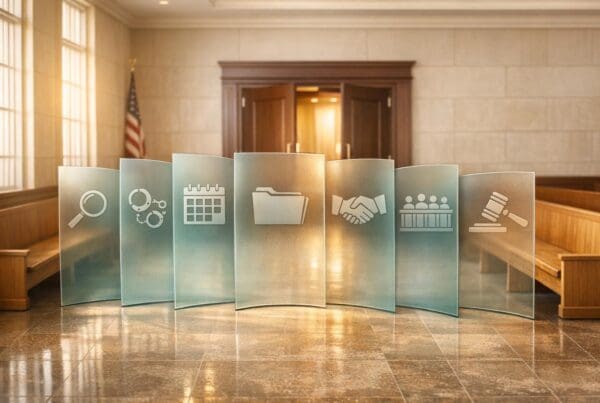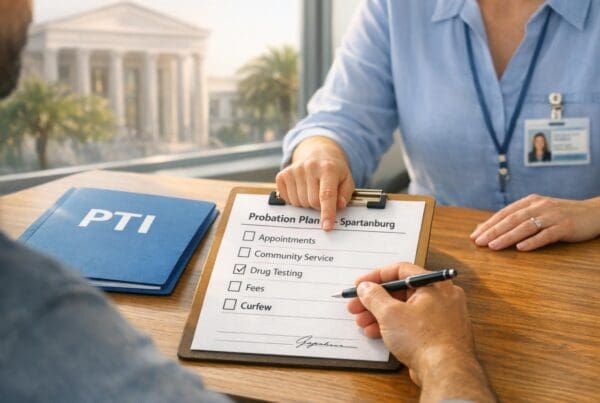Facing misdemeanor charges? It might seem minor, but the consequences can impact your future in ways you might not expect. From permanent criminal records affecting job opportunities to navigating the legal system’s complexities, having a lawyer can make a significant difference in protecting your rights and future.
Key Takeaways:
- Misdemeanor Charges in South Carolina: Divided into Class A, B, C, and exempt offenses, with penalties ranging from fines to jail time (up to 3 years for Class A).
- Long-Term Impact: Convictions can affect employment, housing, and professional licenses.
- Why Legal Help Matters: Lawyers navigate intricate procedures, negotiate better plea deals, and protect your constitutional rights.
- Local Expertise: Understanding South Carolina laws and court dynamics helps build a stronger defense.
Without legal guidance, you risk harsher penalties, procedural mistakes, and long-term setbacks. A skilled attorney ensures your case is handled effectively and your future safeguarded.
What Are Misdemeanor Charges in South Carolina

In South Carolina, misdemeanors are criminal offenses that sit between minor infractions and more serious felonies. While felonies can lead to prison sentences exceeding three years, misdemeanors are limited to a maximum of three years behind bars.
The state uses a classification system to organize most misdemeanor offenses. Understanding which category your charge falls into is crucial for grasping the potential outcomes.
Types of Misdemeanor Crimes
Misdemeanors in South Carolina are divided into Class A, B, C, and exempt offenses. There’s also a special group called "exempt misdemeanors", which includes charges that don’t fit neatly into the standard categories.
- Class A misdemeanors: These include offenses like vandalism, first-degree harassment, joyriding, sending obscene messages without consent, second-degree assault and battery, and first-offense shoplifting.
- Class B misdemeanors: This category covers mid-level crimes, such as using counterfeit tickets, participating in a riot, submitting false claims for benefits, first-offense possession of controlled substances, third-offense animal cruelty, and using a firearm while under the influence.
- Class C misdemeanors: These typically involve charges like hazing, discharging a laser at an aircraft, fraudulent registration or voting, impersonating a police officer, slander, libel, and assault with a concealed weapon.
- Exempt misdemeanors: Examples include domestic violence in the third degree, negligently allowing a fire to spread to another’s property, and unlawful trespassing.
It’s worth noting that repeated offenses can lead to more severe consequences. For example, a misdemeanor property crime could be upgraded to a Class E felony after a third conviction.
Penalties You Could Face
The penalties for misdemeanors in South Carolina vary by classification, but all come with serious repercussions beyond just financial fines.
| Misdemeanor Class | Max. Jail Time | Maximum Fine | Example Offenses |
|---|---|---|---|
| Class A | Up to 3 years | Up to $5,000 | Vandalism (third offense), joyriding, shoplifting |
| Class B | Up to 2 years | Up to $2,500 | Riot participation, drug possession (first offense) |
| Class C | Up to 1 year | Varies | Hazing, impersonating a police officer, fraudulent registration or voting |
In addition to jail time and fines, a conviction can lead to probation, community service, or court-mandated treatment. A misdemeanor conviction also leaves a permanent criminal record, which can impact job prospects, professional licenses, housing applications, and even your voting rights while incarcerated.
Some courts offer alternative sentencing options, such as probation, community service, specialized court programs, or restitution payments. While these alternatives may help you avoid jail time, they still result in a conviction and come with their own restrictions.
Problems with Representing Yourself
Representing yourself in court might seem like a way to save money, but it often puts your case – and your future – at serious risk. Without legal expertise, you’re more likely to face worse outcomes and higher long-term costs, even for something as seemingly minor as a misdemeanor charge.
Legal Procedures Are Complicated
The legal system is full of intricate rules and procedures that can trip up even the most well-intentioned self-represented defendants. In South Carolina, for example, strict adherence to technical rules is non-negotiable. From filing deadlines to evidence submission, every step must be executed perfectly. Even a small mistake, like missing a deadline or misfiling a document, can severely harm your defense.
"A person acting as their own lawyer in a New Jersey court will be required to follow the rules, policies, and procedures of the court. If you get something wrong, there will be no do‐overs."
When you represent yourself, the court holds you to the same standards as a seasoned attorney – no exceptions. While South Carolina’s Code of Laws is publicly accessible, understanding how those laws apply to your specific case requires a level of expertise that court staff cannot provide. They can give basic information, like court dates or fine amounts, but they are prohibited from offering legal advice. Even laws that seem straightforward can have hidden complexities, and navigating the system’s technical language and strict timelines is no small task.
Criminal Records Affect Your Future
A misdemeanor conviction is not just a short-term inconvenience – it leaves a permanent mark on your criminal record. This can create lasting barriers to employment, housing, and professional licensing opportunities.
Without an attorney, you may not fully grasp the long-term consequences of your decisions. For instance, you might accept a plea deal that seems reasonable at the time, only to discover later that it limits your future options. Alarmingly, over 95% of convictions are resolved through guilty pleas. Many self-represented defendants rush into these agreements without exploring alternatives that could better safeguard their future.
You Might Accidentally Hurt Your Case
Beyond procedural missteps, the pressure and stress of representing yourself can lead to poor decision-making. Emotions often cloud judgment, causing you to make impulsive choices that weaken your defense. For example, you might present evidence you believe helps your case, only to have it used against you by the prosecution.
Courtroom proceedings are intense, especially when your freedom is at stake. Most people are unprepared for challenges like cross-examination or navigating formal legal protocols. Negotiating plea deals is another area where self-represented defendants typically struggle. Prosecutors, who are under no obligation to explain your options, can easily spot when someone is unfamiliar with the system.
"The legal system is complicated, and without legal expertise, you may not be able to effectively handle the legal system, worsening your chances of a positive outcome."
- Weinstein Legal Team Staff
Statistics show that most individuals who represent themselves lose their cases, often with devastating results. Only about 10% of criminal defendants choose self-representation, and those who do frequently face harsher outcomes compared to those with legal counsel. On top of that, judges and juries may unconsciously view self-representation as a sign that your case lacks merit or that you aren’t taking the charges seriously. This bias can influence how your arguments and evidence are perceived.
All of these factors highlight why having professional legal representation is critical when facing misdemeanor charges.
How Lawyers Help with Misdemeanor Cases
Hiring an attorney for a misdemeanor case can transform a stressful and confusing process into one with clearer paths and better results. A lawyer doesn’t just represent you – they become your advocate, strategist, and protector, working to ensure the best possible outcome. Their role spans everything from crafting a legal defense to negotiating with prosecutors and safeguarding your rights.
Legal Knowledge and Courtroom Expertise
Criminal defense attorneys bring specialized skills and a deep understanding of the legal system, which can make a huge difference in how your case is resolved. They’re trained to navigate the complexities of the law, spot weaknesses in the prosecution’s case, and identify procedural errors or constitutional violations that might otherwise go unnoticed.
For example, attorneys meticulously review police reports and witness statements, searching for inconsistencies or mistakes that could undermine the prosecution’s evidence. In some cases, they can challenge or exclude evidence before it even reaches trial.
Beyond just focusing on fines or potential jail time, lawyers consider how a conviction might affect your future. This includes factors like your driving privileges, professional licenses, immigration status, or job prospects. With this broader perspective, they craft defense strategies that protect not only your immediate freedom but also your long-term opportunities.
"A criminal defense attorney is vital in misdemeanor cases, ensuring a defendant’s rights are protected throughout the legal process. Their expertise can alter case outcomes by negotiating plea bargains, mitigating charges, and providing informed counsel on potential penalties." – Masterson Hall
Attorneys also bring practical advantages. They understand how local courts operate, including the tendencies of specific judges and prosecutors. This insider knowledge allows them to time motions, present compelling arguments, and anticipate the other side’s strategies effectively.
But their skills don’t stop at legal expertise – they’re also skilled negotiators.
Negotiating Better Outcomes
Plea bargains play a crucial role in resolving misdemeanor cases. In fact, over 90% of criminal convictions come from plea agreements. Since misdemeanors account for roughly 80% of state criminal dockets, prosecutors often handle these cases in bulk, making negotiation a key part of achieving favorable results.
Attorneys with a strong trial record can leverage their reputation to secure better deals. Prosecutors may prefer to offer reasonable plea agreements rather than risk losing in court. Lawyers can also explore alternative resolutions, such as diversion programs, drug courts, or community service, which might help you avoid a conviction altogether.
Their role is not just about securing deals but also ensuring you fully understand the terms and consequences of any plea. By explaining both immediate penalties and long-term impacts, they help you make informed decisions.
And while negotiation is critical, protecting your rights is equally important.
Protecting Your Rights Every Step of the Way
Your constitutional rights are only meaningful if they’re upheld, and that’s where defense attorneys come in. From the moment of your arrest to the final resolution of your case, they ensure that law enforcement, prosecutors, and the courts follow proper procedures.
This includes verifying that there was probable cause for your arrest, ensuring your Miranda rights were read, and challenging any illegally obtained evidence. If necessary, they can file motions to exclude such evidence or even have charges dismissed entirely.
Attorneys also advocate for fair sentencing, presenting mitigating circumstances and proposing alternatives that account for your personal and professional future. They make sure you’re not pressured into accepting a plea deal that isn’t in your best interest by clearly outlining all options and the potential risks of going to trial.
Since a misdemeanor conviction can have lasting effects on your employment, housing, and reputation, a skilled lawyer works to minimize those consequences. Their goal is not just to resolve the immediate case but to protect your future as well.
Why Local Knowledge Matters in South Carolina
When you’re dealing with misdemeanor charges, having someone who understands the local legal landscape can make all the difference. Each state has its own set of rules, traditions, and legal practices. What works in one state might not work in another, and South Carolina is no exception. Local expertise plays a big role in crafting strategies that work in court.
South Carolina Court Rules and Procedures
South Carolina takes a unique approach to handling misdemeanors, classifying them into three categories – Class A, B, and C. Each class comes with its own maximum penalties, which can have a big impact on your future.
| Misdemeanor Class | Maximum Imprisonment |
|---|---|
| Class A | 3 years |
| Class B | 2 years |
| Class C | 1 year |
Understanding these classifications is critical. The difference between a Class A and Class C misdemeanor could mean serving three years instead of one. On top of that, South Carolina has "exempt misdemeanors", which carry sentences up to one year. A skilled local attorney can pinpoint the exact classification of your charges and predict the potential consequences.
Your prior criminal record also matters a lot. Even a single misdemeanor conviction can lead to harsher penalties if you have previous offenses. The state does offer expungement, but it comes with strict conditions.
Working with Local Courts and Prosecutors
Beyond knowing the rules, navigating South Carolina’s legal system often comes down to relationships and understanding the local dynamics. Attorneys who regularly work in South Carolina courts have access to practical insights that you won’t find in any legal manual.
"Lawyering is all about people." – ABA Article
Local attorneys know the preferences and tendencies of individual judges. For example, some judges might lean toward alternative sentencing options like community service, while others might focus more on restitution. This allows an attorney to adjust their strategy to fit the courtroom they’re in.
Relationships with prosecutors are just as important. Attorneys with local connections often have a better understanding of which prosecutors are open to plea deals or diversion programs. This can make negotiations more productive and increase the chances of a favorable outcome.
"Court rooms can be similar to high schools. There is a dress code, albeit unspoken. There are certain norms to be observed. One unspoken rule is that a lawyer should not stand out as being different from the other lawyers. Your lawyer should be one of the guys [or girls]." – The Florida Litigator
Even details like knowing the court staff – clerks, bailiffs, and administrators – can make a difference. These connections ensure that paperwork gets filed correctly, court dates are scheduled without issues, and procedural steps are handled smoothly.
Another advantage? Understanding the local jury pool. Attorneys who practice in South Carolina know the values and attitudes of the community, which can shape how a case is perceived during a trial. Strategies that might work in Charleston could fall flat in a smaller rural county. This local insight allows defense strategies to be fine-tuned to fit the audience, giving clients a stronger chance in court.
sbb-itb-ce0cbb0
How Brendan M. Delaney Law Firm LLC Handles Misdemeanor Cases

When you’re facing misdemeanor charges, having a lawyer who understands your specific situation can make all the difference. At Brendan M. Delaney Law Firm LLC, the focus is on creating defense strategies that not only address your immediate legal needs but also protect your future. With a combination of local knowledge and strong negotiation skills, the firm offers a distinctive approach to criminal defense.
Personalized Defense Plans
No two misdemeanor cases are exactly alike, and cookie-cutter solutions just don’t cut it. That’s why the firm takes the time to evaluate every client’s unique circumstances – looking at factors like employment, family obligations, and long-term goals – before crafting a defense plan tailored to your needs.
"Brendan M. Delaney will diligently fight for your rights in obtaining the most favorable outcome in your matter depending upon the unique circumstances of your case. Brendan takes a client-centered approach to the law."
This client-focused approach doesn’t just aim to resolve the legal issue at hand; it also considers how the outcome might affect your life down the road.
Over 24 Years of Criminal Defense Experience
With more than 24 years of experience, the firm has a deep understanding of South Carolina’s legal landscape. Whether through skilled plea negotiations or strong trial representation, this expertise helps secure the best possible outcomes. The firm’s familiarity with South Carolina courts and procedures allows them to adapt strategies to meet the specific demands of each case.
Looking Out for Your Future
The impact of a misdemeanor conviction can stretch far beyond the courtroom. It can affect your ability to secure employment, housing, or professional licenses. Brendan M. Delaney Law Firm LLC doesn’t just defend you in court – they also work to protect your long-term opportunities. When possible, the firm pursues remedies like expungement to help minimize the lasting effects of a conviction .
Beyond legal representation, the firm provides practical advice for navigating life after a legal issue. This includes tips on addressing criminal history in job applications, pursuing additional education to improve qualifications, and leveraging personal and professional networks to create new opportunities.
Why You Need a Lawyer for Misdemeanor Charges
Navigating misdemeanor charges without legal help might seem like a way to save money, but it can lead to costly mistakes. The legal system is full of intricate rules and procedures that can feel overwhelming for someone without proper training.
"The courtroom operates on rules and procedures that can seem like a foreign language to those without legal training. One misstep could mean the difference between winning and losing, and in criminal cases, the stakes are even higher." – Texas Criminal Defense Group
In South Carolina, even a small procedural error can have lasting consequences. You could lose your right to appeal or face harsher penalties simply because of a misstep. On top of that, the stress of representing yourself might push you into accepting a plea deal too quickly or prevent you from recognizing when the prosecution is overreaching. A lawyer brings objectivity to the table, spotting opportunities and strategies that you might miss.
The impact of a conviction goes far beyond the courtroom. It can stain your record, making it harder to find a job, secure housing, maintain professional licenses, or even pursue education. These long-term consequences often outweigh the cost of hiring an attorney.
A skilled lawyer does more than just represent you in court – they protect your rights, evaluate all possible defenses, and work toward the best possible outcome. No amount of online research can replace the expertise and strategic thinking a professional brings to your case.
When facing misdemeanor charges in South Carolina, having an experienced lawyer on your side isn’t just helpful – it’s crucial. Your freedom and future depend on making the right choice.
FAQs
How can a misdemeanor conviction affect your future opportunities?
A misdemeanor conviction can leave a lasting mark on your life, affecting more than just your immediate circumstances. It might make it harder to land a job, climb the career ladder, or secure the licenses and certifications needed for certain professions. Even finding a place to live can become a challenge, as some landlords may hesitate to rent to someone with a criminal record.
The ripple effects don’t stop there. Financial difficulties often follow, and the conviction can create long-term obstacles to both personal and professional progress. These challenges can linger for years, making it crucial to take misdemeanor charges seriously. Working with an experienced attorney can make all the difference in safeguarding your future.
How does hiring a lawyer improve my chances of getting a better plea deal in a misdemeanor case?
Hiring a lawyer can make a big difference when it comes to negotiating a better plea deal in a misdemeanor case. Attorneys know how plea bargaining works and can negotiate effectively with prosecutors to aim for reduced charges, lighter penalties, or even alternative solutions. They’re skilled at analyzing the evidence against you, spotting weaknesses in the prosecution’s case, and leveraging that information to help your situation.
On top of that, a lawyer ensures your rights are protected every step of the way. They can help you avoid agreeing to terms that might lead to serious long-term issues, like a permanent criminal record. With an experienced attorney by your side, you’re in a much stronger position to reach a better outcome than if you were to handle the process alone.
Why is hiring a lawyer with South Carolina expertise important for misdemeanor cases?
Why You Need a South Carolina Lawyer for Misdemeanor Charges
When facing misdemeanor charges in South Carolina, hiring a lawyer who knows the state’s laws inside and out is crucial. Local attorneys are well-versed in the state’s specific legal procedures, court systems, and statutes. This deep understanding can be the key to safeguarding your rights, crafting a solid defense, and working toward the most favorable outcome.
Beyond just knowing the law, a seasoned South Carolina lawyer can guide you through plea negotiations, help reduce penalties, and address potential long-term effects, such as having a criminal record. Their familiarity with the local courts and the subtle intricacies of the legal process ensures that your case is managed efficiently and with your best interests at heart.





